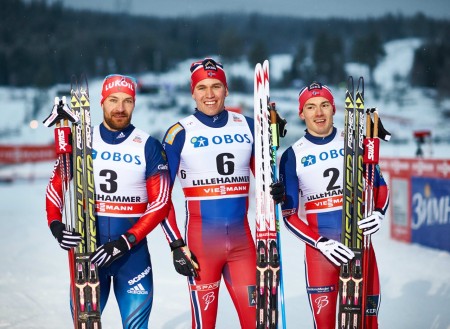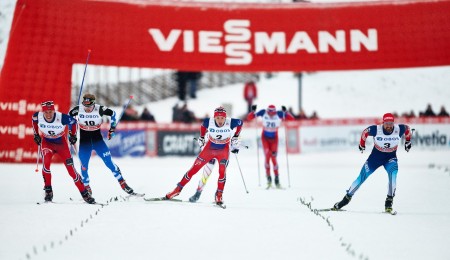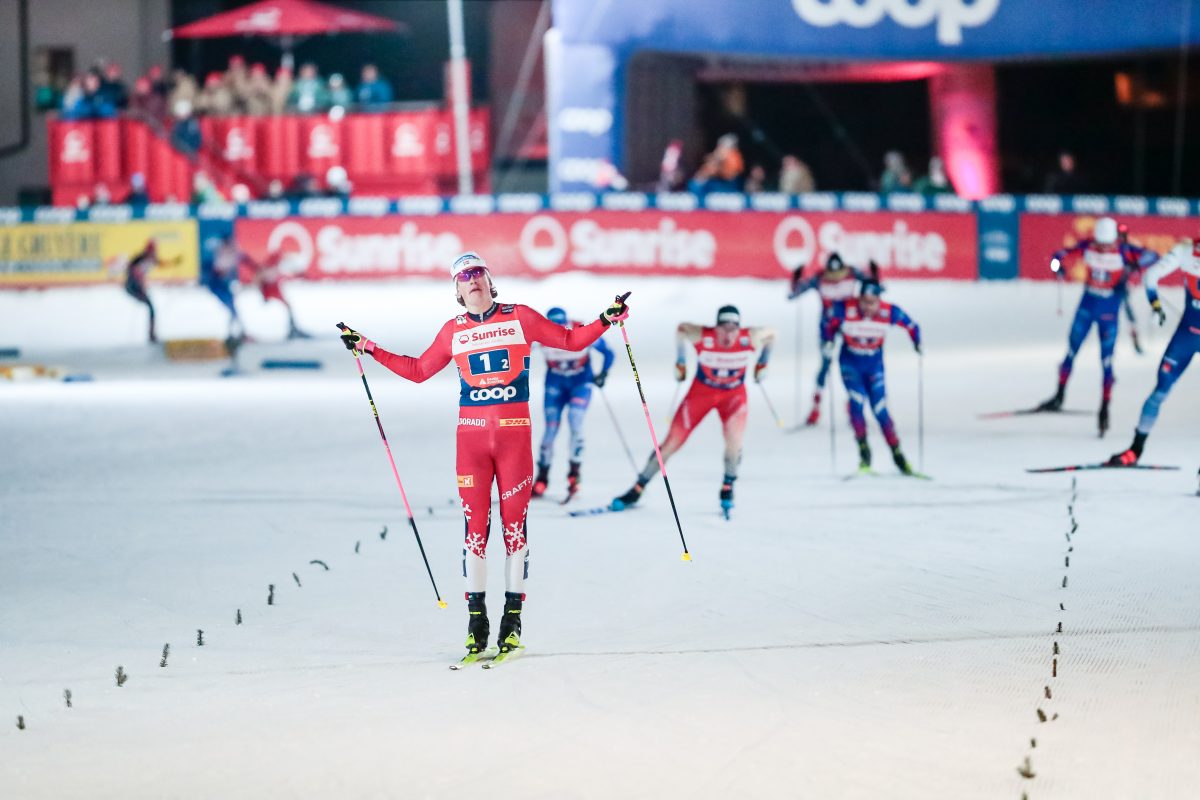
If you don’t count the Norwegians, most everyone’s skis in Friday’s 1.5-kilometer freestyle sprint were relatively even in terms of speed, according to men’s finalist Alex Harvey of Canada.
But the reality is, Norway is a big part of essentially every World Cup race, let alone one in Lillehammer, Norway. Their often-superior skis can be pivotal to their success, but they’re not the only thing they rely on.
Unless you ask Pål Golberg.

After winning the men’s skate sprint — the first of three races in Lillehammer’s mini tour — by 0.24 seconds over Russia’s Alexey Petukhov, Golberg said in a press conference that his skis were so good, he simply had to believe he could win.
While that was easier said than executed, the 24-year-old Norwegian’s thought process worked.
“I have a past as a sprinter, so I should be doing well here,” Sundby told NRK. “But it’s fun to prove that I can do both [sprint and distance].”
Golberg stood as the sixth-fastest qualifier behind Russia’s Sergey Ustiugov, who clocked the fastest time of 3:14.99. In the qualifier standings, he followed his teammate Finn Hågen Krogh in second, Petukhov in third, Norway’s Petter Northug in fourth, and Sweden’s Calle Halfvarsson in fifth. Ten Norwegians qualified in the top 30, including several distance specialists: Sjur Røthe (in ninth), Martin Johnsrud Sundby (13th) and Niklas Dyrhaug (20th).
But Golberg, who’s notched seven World Cup podiums in sprints and won a 15 k classic in Lillehammer in 2013, went on to win his quarterfinal on Friday in a photo finish with Norwegian U23 Team member Emil Iversen. He beat out Sweden’s Emil Jönsson, Norway’s Ola Vigen Hattestad, Halfvarsson, and Great Britain’s Andrew Musgrave, in that order, with the second-fastest quarterfinal time of the day in 3:18.56.
Far from done, Golberg squeezed out another victory in his semifinal, this time over Finland’s A-team sprinter Juho Mikkonen in second and Ustiugov in third in a three-way photo finish. (Northug was relegated from fourth behind Ustiugov to last after cutting off Ustiugov in the finishing straight. Jönsson received a warning for a similar action in the quarterfinal, after impeding Iversen.)
Krogh won the other semifinal after dominating his quarterfinal as well — initially beating out France’s Jay Renaud by 0.22 seconds, Harvey (+0.36) and Mikkonen (+0.48), then winning his semifinal in 3:19.57, about 1.7 seconds faster than Golberg. He topped Petukhov (+0.11), Iversen (+0.37), Harvey (+0.59), Larkov (+0.66), and finally, Jay (+1.61) to do so.
Despite finishing third and fourth, Iversen and Harvey advanced to the final as lucky losers with the next-fastest semifinal times. For Harvey, it was his second time advancing in that fashion after doing the same with Mikkonen in the quarterfinal.
From there, teammates Golberg and Krogh would meet in the final, along with 23-year-old Iversen — and Petukhov, Mikkonen and Harvey.
“I knew I had good glide,” Golberg recalled in a translated interview with NRK. “If I managed to keep my back to Finn, I knew I was the only one who stood between myself and the finish. My skis were so good they almost did the job on their own.”
That kind of confidence allowed Golberg to sit patiently behind until the final climb, when he caught a ride out of the sharp lefthand-downhill corner and glided into the start of the long hill. Positioned around fourth with Petukhov and Iversen in tow, Golberg and Petukhov swallowed Harvey in third coming out of the bend. Golberg carried his momentum and attacked for second place by the top, trailing Krogh into the stadium. Petukhov went with him.

With a downhill into and around the final curve before the finish, Golberg and Petukhov put the pressure on Krogh — an early leader in the final. Golberg trusted his skis once more and powered past Krogh, winning in 3:20.51 while Krogh and Petukhov duked it out for second. Petukhov emerged on the better end of the photo finish, five-hundredths of a second faster than Krogh for second and 0.24 behind Golberg.
After taking a gutsy leap to the front out of the start, Mikkonen held strong for fourth (+0.56) and Harvey ran out of gas but pushed for fifth (+1.13) ahead of Iversen in sixth (+4.15).
“Right after the finish I was not so satisfied,” Krogh told FIS after cameras caught him shaking his head in disappointment. “I wanted to win, but now I am happy. My plan was to gain a gap before the final stretch, maybe if the gap was bigger I could have won.”
Petukhov explained he knew he had to catch Krogh and Golberg if he wanted a shot at the win.
“I think I could have skied better tactically today, but I am happy for the second place. Pål was very strong today,” he told FIS.
Harvey had similar respect for Petukhov and Krogh.
“I knew from the beginning that the last uphill was crucial,” he said in a phone interview with FasterSkier. “Finn Hågen has won skate sprints on big uphills and Petukhov is a beast on skate sprinting up big hills, so I knew what their move would be even before I skied with them, and I knew I had to make a move there, but for me it’s hard. I feel good coming into that last uphill, but I just can’t go, I just don’t have it yet. I knew I had to position myself first, second or third before the last downhill, but I just couldn’t do it because I didn’t have the jam in there.”
Day 1 put Golberg in the mini-tour lead by 2 seconds over Petukhov. Krogh is 4.9 seconds back in third, Mikkonen 10.2 in fourth, Ustiugov 11.5 in fifth (thanks to bonus seconds from his qualifier win), and Harvey 11.8 seconds back in sixth.
“It set me up good now I have to make sure I stay in the top five,” Harvey said. “After tomorrow, a couple of the guys ahead of me will slip after the 10 k [freestyle]. I think I’m in a good position, something like 15 seconds clear of Sundby and [6.6 seconds ahead] of Petter so I have to use that to my advantage tomorrow.”
Sundby, who was third in his quarterfinal (behind Golberg and Iversen) for 14th overall on Friday, is currently 15th in the mini-tour standings, 27 seconds behind Golberg. Northug, who ended up 12th after being relegated to last in his semifinal, sits in 10th, 18 seconds back from the leader.
“Tomorrow what matters is not the position, it’s the time behind the leader or maybe be the leader,” Harvey said. “Just be able to start in a good group on Sunday. I couldn’t have asked for a much better position than I am now. Any time you make a final in a mini tour or a Tour de Ski, you get a lot of advantage [in that mini tour] compared to other distance skiers.”
Seventh Last Weekend, Harvey Up to 5th
The only North American man to qualify for the rounds in 22nd, 6.26 seconds off the top qualifying time, Harvey went on to experience the angst and joy of being a lucky loser twice.
Third in his quarterfinal behind Krogh and Jay, he said he could tell their heat was a fast one based on the way it felt and information from his team’s wax technicians.
“I knew we had a chance of lucky loser already because I knew the first three heats were pretty slow — the techs said they were just crawling up the hill,” Harvey said. “Then I had a good finish, but already I could tell that I was missing some push, some power on the last uphill. Like in offset [V1] on the steep stuff, I was feeling fresh entering that uphill, but I could never have enough speed as the sprinters, but I was lucky to have a fast-enough finish.”
Krogh led their quarterfinal early on, and Poland’s Maciej Starega put himself in second early just ahead of Røthe. Harvey moved from fourth to third, eventually behind Krogh and Røthe, on the long descent before Jay attacked on the climb and Harvey slipped to fifth. The Canadian recovered, pushing into the stadium for third, 0.12 seconds ahead of Mikkonen, who came on late for the last lucky loser spot into the semis.
In the semifinals, Harvey knew his heat had to be faster than the first if he wanted to make the final.
“I knew that the first semi had gone really slow, so the plan was if I could take the lead, I would just go full blast and try to clock a decently fast time to give me a better chance at making the final,” he said. “With a mini tour like that, you get a lot of bonus seconds [for making the final].”
And that was his overarching goal. More bonus seconds meant a more competitive position for the second day of racing.
So, to the Eurosport announcers’ surprise, the usually calm-and-collected Harvey took control out of the start of his semifinal. From their estimations, he was “trying to conserve energy whilst leading” and did so all the way into the base of the big climb before the finish.
However, Krogh and Petukhov shot passed him on the way up it, and Harvey entered the final straight in fourth behind Iversen.
Regardless of his place, his tactic worked. Harvey heard a split after the first climb, around 40 seconds into their semifinal, that they were two seconds faster than the first heat. If they held up that pace, he knew he could finish outside the top two and still make the final.
“I’m usually pretty slow at the start so sometimes that’s my plan, to go to the front and push the pace, but it’s not every day that it happens,” he said.
In the final, Harvey said he looked back for the first time all day because he couldn’t hear anyone behind him — when he was in third behind Krogh and Mikkonen.
“About two-thirds of the way, we had a little gap,” he said. “[I looked back and] I saw that Petukhov was like four or five meters behind. I thought maybe we had a chance to break away and we did.”
Heading into the big hill, which he described as not as steep but longer than Kuusamo’s final 240-meter climb at around 315 meters, Harvey struggled to stay with the pace once again. It didn’t help him that fresh snow overnight made the track slower, and required V1 instead of the V2 he had been able to use to ski up it on Thursday.
“I felt good; I didn’t feel like I was spent or anything,” he said of his last time up that hill. “[Golberg and Petukhov] were side by side with me when we hit the really steep stuff, and when I switched to offset, I was going as hard as I could and I was still in a good position. Had I been strong, I would’ve been able to crest over the top in second place.
“It’s really my weakness in skating,” Harvey added. “I’m working on it, I improved a bit, but I’m still not the world’s best. To make a move like that when you’re in the final and you’re against two, three other dudes that are really good, you have to really be one of the best to make a difference there.”
Regardless, it was Harvey’s best result of the season so far. “Last year, I had three wins, and they were all in skating. … I think my best performances over time are in skating,” the 2013 World Championships classic-sprint bronze medalist said.
Alex Kochon
Alex Kochon (alexkochon@gmail.com) is a former FasterSkier editor and roving reporter who never really lost touch with the nordic scene. A freelance writer, editor, and outdoor-loving mom of two, she lives in northeastern New York and enjoys adventuring in the Adirondacks. She shares her passion for sports and recreation as the co-founder of "Ride On! Mountain Bike Trail Guide" and a sales and content contributor at Curated.com. When she's not skiing or chasing her kids around, Alex assists authors as a production and marketing coordinator for iPub Global Connection.



